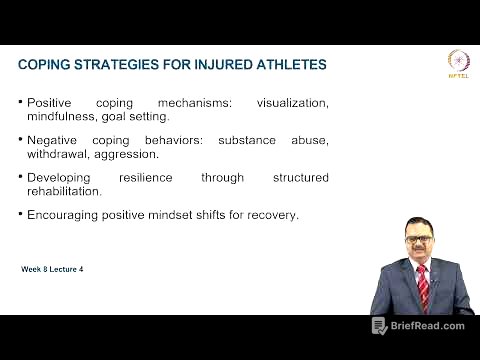TLDR;
The video discusses the rapid advancement of AI and its potential impact on various industries and jobs. It emphasizes the importance of adapting to these changes and provides eight key principles to thrive in the AI-driven economy. These principles include embracing AI, developing AI literacy, mastering prompt engineering, thinking like a manager of AI agents, cultivating human skills, developing T-shaped expertise, committing to continuous learning, and building a personal brand. The video encourages viewers to take action and position themselves at the forefront of this transformation.
- AI is rapidly advancing and transforming industries.
- Adapting to AI is crucial for future success.
- Key principles include embracing AI, developing AI literacy, and continuous learning.
- Building a personal brand and cultivating human skills are essential.
AI’s Moving Fast — Here’s Why You Can’t Afford to Wait [0:00]
The speaker shares a personal experience of using Replet to code a website in 20 minutes, highlighting the speed and potential of AI. She also mentions a story of someone building their own CRM using AI tools. These examples illustrate that AI is not just hype but a rapidly evolving technology. The speaker emphasizes that those who act now will lead in the future. She cites statistics showing that a significant percentage of major companies already have chief AI officers and are integrating AI into core operations. The speaker notes the intense changes happening across industries, with both positive and negative signals, and stresses the urgency to act. The global AI market is expected to grow significantly by 2030, and the current moment is compared to the early days of the internet and mobile apps, presenting a massive opportunity for those who take deliberate action.
The Hiring Shift That Changed How We See Talent [1:36]
The speaker emphasizes the need to adapt hiring processes to account for AI proficiency. Companies are now looking for candidates who not only possess traditional skills but also demonstrate an understanding of AI tools and their potential applications. The speaker shares that her company has started asking candidates about the AI tools they use, their depth of knowledge in AI, and how they think AI can replace some of their functionality. The goal is to find individuals who can leverage AI to enhance their roles and potentially take on additional responsibilities. This shift reflects a broader trend of businesses integrating AI into their core operations and seeking employees who can drive innovation and efficiency through AI.
Principle #1 — Most People Are Still Ignoring This [4:58]
The first principle is to not ignore AI but to actively use it. While many workers worry about AI replacing them, curiosity is more beneficial than fear. AI excels at data processing, pattern recognition, and repetitive tasks but struggles with nuance, ethical judgment, and emotional intelligence. The goal is not to beat AI but to leverage it and become a "super person" who knows how to use it intelligently. The speaker advises examining current job responsibilities to identify repetitive tasks that AI could handle. She shares examples of how her team is experimenting with AI tools to automate tasks such as checking videos for errors and structuring courses. The speaker encourages practicing a "human in the loop" model where AI handles the grunt work, and humans provide critical judgment.
Principle #2 — Why the “New Literacy” Will Make or Break You [7:14]
The second principle is to develop strong AI literacy. The speaker tasks her team with testing new AI tools relevant to their niches. She shares a story of a company that significantly reduced its workforce while increasing revenue through AI adoption. When hiring, the speaker looks for individuals excited about innovation, willing to optimize processes, and adaptable to change. LinkedIn data shows a significant increase in professionals adding AI literacy skills to their profiles. Employers want team members who understand AI's potential to impact their roles and can think creatively about how to leverage it. The speaker advises subscribing to AI-related content, joining online communities, and asking about favorite AI tools during interviews to stay informed.
Principle #3 — A Skill That 10x’s Your AI Results [9:32]
The third principle is to master prompt engineering. Despite the attention it has received, prompt engineering remains an underrated skill. The speaker emphasizes that with more sophisticated AI tools, the quality of results depends heavily on the quality of prompts. She shares her experience with Replet, noting that detailed explanations and instructions are necessary for optimal performance. The speaker provides an example of using detailed descriptions of a company mascot to ensure consistency in AI-generated videos. The better the prompts, the better the results.
Principle #4 — Stop Using AI Like a Tool — Do This Instead [10:37]
The fourth principle is to start thinking like a manager of AI agents. Instead of viewing AI as a threat, individuals should establish themselves as AI champions within their organizations. The speaker shares how she encourages her children to use AI tools creatively, such as prompting AI to generate specific cartoon characters. This mindset shift involves recognizing that AI agents will replace doers, and humans will manage these agents. The speaker recounts a conversation with a partner from Sequoia, who noted that AI is significantly transforming coding, legal work, and big data analysis. In these industries, AI knowledge and tool usage are becoming essential.
Principle #5 — The One Advantage AI Can’t Replicate [12:52]
The fifth principle is to cultivate human superpowers. While AI excels at data processing and analysis, uniquely human abilities such as emotional intelligence, ethical reasoning, and interpersonal communication become increasingly valuable. The speaker emphasizes the importance of focusing on skills that AI cannot replace.
Principle #6 — Why Generalists with This Edge Will Win [13:14]
The sixth principle is to develop T-shaped expertise, which involves having deep knowledge in one area while also possessing broad knowledge across different fields to connect the dots. Academic knowledge is less critical because information is readily accessible. Understanding broader concepts, such as design, culture, physics, and AI, combined with a deep skill in a specific area like design, sales, or law, makes individuals significantly more valuable. The speaker shares how she encourages her daughters to explore their interests while also ensuring they develop essential human qualities and a broad understanding of the world.
Principle #7 — The Habit Separating Fast Movers from the Rest [14:44]
The seventh principle is to commit to continuous learning. The World Economic Forum estimates that a significant percentage of employees will need reskilling due to AI advancements. The shelf life of professional skills is shrinking dramatically, requiring a mindset of constant exploration and improvement. Strategies and skills that are effective today may only be relevant for a short period, necessitating a willingness to adapt and embrace change.
Principle #8 — The Career Moat You Need to Build Now [15:39]
The eighth principle is to build a personal brand. While AI can automate content creation, human connection and trust remain essential. People want to learn from and connect with real humans, especially when it comes to complex topics like AI and education. Building a following can be a valuable asset, even for those developing AI apps, as it helps with marketing and breaking through the noise. The speaker emphasizes that unique beliefs, voice, and story are what resonate with people. She advises sharing expertise, building a portfolio on social media, developing a unique point of view, and creating content that demonstrates the thinking process.









